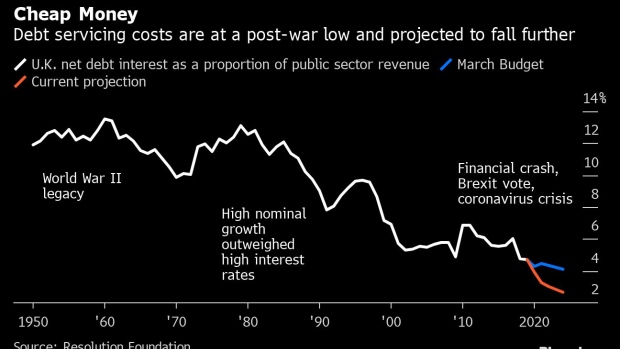(Bloomberg) -- U.K. Prime Minister Boris Johnson’s government faces a coronavirus dilemma, and how it responds could set the tone of the economy for years to come.
If it withdraws its massive support for jobs and wages too soon, it’ll tip Britain into an unemployment crisis just as other risks, such as Brexit, threaten to clobber growth.
If it extends the aid -- as opposition politicians are urging it to do -- that could dissuade Britons from quitting jobs that may never return anyway, and hinder a necessary restructuring.
Both options are costly on the face of it. Chancellor of the Exchequer Rishi Sunak’s furlough programs have cost the treasury almost 35 billion pounds ($46 billion) so far. Mass unemployment or unproductive workplaces could be far more expensive in the longer run though -- with political repercussions for Johnson’s Conservatives.
More than a fifth of the workforce was temporarily away from paid engagements in June, and it’s unclear how many of them will have jobs to go back to.
“It seems certain that at this point the furlough scheme is indeed preserving a significant number of ‘zombie jobs’,” said Jonathan Portes, an economist at King’s College London, in an article for Prospect Magazine. “Job destruction and job creation is a necessary part of a dynamic economy.”
Sunak has indicated he backs that view, though another factor likely weighing on his mind is the sheer expense of government aid, which must ultimately be justified to voters.
The economy is bouncing back so far anyway. It expanded a record 8.7% in June, paring a second-quarter contraction that at 20.4% was bigger than any other major economy.
Yet the Bank of England says the strength of the rebound and its sustainability depend on jobs. The unemployed don’t spend as much, and they tend to lose their skills over time so total productivity suffers.
Those arguing that Sunak should bite the bullet and drop his plan to phase out support completely by October can point to the fact that ultra-low interest rates mean the government can afford it.
Still, determining which parts of the economy will return to their pre-virus situation if only they get the necessary support now, and which will be fundamentally altered or disappear, isn’t simple.
Data Wednesday showed services were especially hard hit by the lockdowns, led by restaurants and hotels. Finance and real estate also suffered, but much less so. Construction led the rebound in June.
It’s certainly an issue on the minds of many U.K. workers. In a YouGov survey published Wednesday, almost 40% said they’re worried they’ll lose their job, and 60% of Britons said they expect the recession to last at least 18 months.
“Job losses have been mounting, and may only increase as we reach the end of the furlough scheme,” said Tej Parikh, chief economist at the Institute of Directors. “The battle now is to prevent longer-term scarring.”
©2020 Bloomberg L.P.








